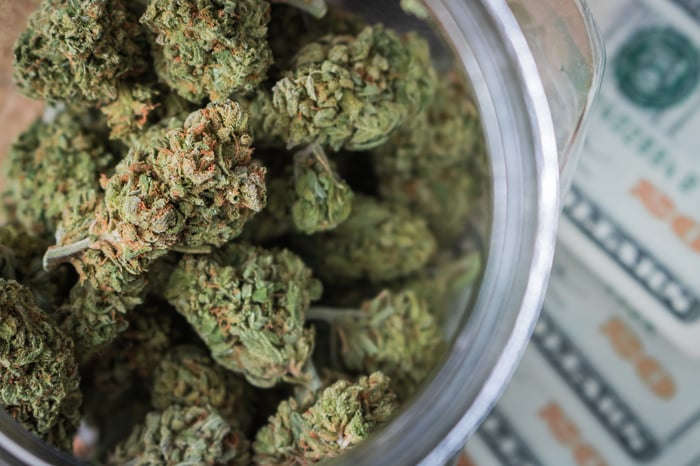To say that the stock market has been unstoppable may not do it justice. It's been more than nine months since the broad-based S&P 500 has undergone a correction of even 5%. What's more, the S&P 500 ended this past Friday, Aug. 27, at its 52nd record high for the year. As a reminder, we still have four months before we close the curtain on 2021.
Yet even with the market racking up one all-time high after another, value can still be found. The following trio of top stocks offers the potential to make investors a lot richer in September, and most importantly, well beyond.

Image source: Getty Images.
Novavax
To begin with, clinical-stage biotech stock Novavax (NVAX 2.52%) is a company with the potential to put a smile on investors' faces this month and for many months to come.
Generally, I'm not the biggest fan of clinical-stage drug developers. That's because the deck is largely stacked against their success. Most drug development ends in failure, and even approved therapies can have a spotty sales track record. However, Novavax is an exception to the rule, and it has its experimental coronavirus disease 2019 (COVID-19) vaccine to thank for it.
In March, Novavax announced that its U.K. study of NVX-CoV2373 (don't these vaccine names just roll off the tongue?) led to an impressive vaccine efficacy (VE) of 89.7%. Three months later, it reported the results of a large-scale trial in the U.S. and Mexico, which yielded a similar vaccine efficacy of 90.4%.
Although VE doesn't tell the entire story -- factors like reducing hospitalizations and death are more important -- a VE of roughly 90% in two separate large-scale studies could allow Novavax's vaccine to give Johnson & Johnson's and AstraZeneca's less-effective COVID-19 vaccines the proverbial heave-ho. This would slot Novavax in as the No. 3 global option in developed markets to fight COVID-19. Considering how many vaccinations still need to be administered, we're talking about billions of dollars in prospective sales as the No. 3 option.
The only reason Novavax's valuation hasn't rocketed higher like some of its COVID-19 vaccine peers is its numerous filing delays. Initially, it was though that Novavax would seek emergency-use authorization in the second quarter in the United States. That's now been pushed back to the fourth quarter. Likewise, production delays have thrown cold water on the company's momentum. Thankfully, delaying things a few months doesn't change the fact that NVX-CoV2373 appears a more attractive option than what J&J and AstraZeneca can offer.
What's more, Novavax could receive a sustainable lift if booster vaccinations become the norm. Some early studies have suggested that VE begins to wane around the six-month mark. For Novavax, we could be talking about a steady recurring revenue stream.
And if this isn't enough to convince you, consider that Novavax is also in the early stages of developing a combination COVID-19/influenza vaccine that could really differentiate it from the competition.
Valued at only three times estimated sales for 2022, Novavax offers significant upside.

Image source: Getty Images.
Jushi Holdings
Another top stock that can make investors richer in September and beyond is U.S. cannabis company Jushi Holdings (JUSHF 1.73%) -- or as I like to call it, the biggest bargain among marijuana stocks.
Interestingly, pot stocks have been in a precipitous downtrend for the past six months. That's because the euphoria surrounding federal legalization under the Biden administration is losing its luster. Though attempts to enact banking reform or even legalization could continue, Wall Street is no longer so certain that federal legalization will occur with President Biden in the Oval Office.
What's important for investors to realize is that federal legalization isn't necessary for pot stocks like Jushi to thrive. We've seen 36 states legalize medical marijuana, 18 of which also have legislation on the books for adult-use consumption and/or retail sale. By mid-decade, New Frontier Data estimates the U.S. legal weed industry could be generating north of $41 billion in annual sales. That's music to Jushi's ears.
For the moment, Jushi's retail-based expansion primarily involves three states: Pennsylvania, Illinois, and Virginia. Combined, these states are likely to make up 80% (or more) of the company's $220 million to $230 million in forecasted sales for 2021. What makes these markets so desirable for Jushi is their limited license issuance. Pennsylvania and Illinois cap the total number of retail licenses issued, as well as how many licenses can be held by one business. Meanwhile, Virginia's retail licenses are assigned by jurisdiction. The point is this: Regulators are purposefully reining in Jushi's competitors, which is giving it a long runway to build up its brands and garner a following in potential billion-dollar markets.
Something else unique about Jushi is the monetary involvement of its insiders. Approximately $45 million of the first $250 million in capital raised by the company came from company insiders and executives. While not foolproof, the odds of investor success go up when insiders have significant skin in the game.
The bottom line is that Jushi should be one of the fastest-growing marijuana stocks through 2025, and it sports the most attractive forward-year price-to-sales multiple in the entire U.S. pot industry. This makes it a screaming buy for growth stock investors.

Image source: Getty Images.
The third and final top stock that'll make you richer in September and beyond is a perfect example of a winning company that just keeps winning. Despite sitting just a stone's throw from an all-time high, there's still significant upside for social media giant Facebook (META 0.14%).
Though it was short-lived, Facebook took it on the chin following its second-quarter earnings results, which were released five weeks ago. Like most online businesses, Facebook cautioned that growth would slow in the second half of the year. That didn't sit too well with Wall Street. But after a few weeks of really digging into Facebook's results and its long-term growth trajectory, Wall Street and investors are coming to their senses.
As of the end of June, Facebook tallied 2.9 billion users visiting its namesake site at least once a month, as well as 610 million unique users visiting WhatsApp and/or Instagram. This combined 3.51 billion monthly active users represents approximately 44% of the entire global population. If we remove those who are simply too young to use social media, it's fair to say that over half the world's adult population is visiting a Facebook-owned asset monthly. With this many eyeballs, it's no wonder advertisers will pay out the nose to get their message in front of users.
The crazy fact I love to bring up when discussing Facebook is that CEO Mark Zuckerberg isn't even fully pressing the gas pedal on his company's core assets. Facebook is on pace for more than $100 billion in ad revenue this year, which will almost entirely be generated by its namesake site and Instagram. Neither WhatsApp nor Facebook Messenger, two of the most-visited social platforms in the world, have been meaningfully monetized as of yet.
Need more evidence that Facebook has huge growth in its future? Take a closer look at its "Other" category on its income statements. This is the category that contains sales of Facebook's Oculus virtual reality (VR) devices. Facebook is positioning itself to become a leader in VR and augmented reality (AR), and rapid sales increases in its "Other" revenue segment suggests it's gaining traction. While the pandemic has undoubtedly helped, VR and AR should be consistent growth trends throughout the decade.
And did I mention Facebook is still reasonably cheap? A company that's consistently growing its sales by 20% or more annually shouldn't be valued at only 23 times forward-year earnings. All of these factors make Facebook a no-brainer buy in September.





